The United States & the Middle East
Syllabus
Description
Objectives
Requirements
Evaluation
Required Texts
Outlines
Webliography
Bibliography
Films
Photo Gallery
Study Guides
Timeline
Style Sheet
Contact
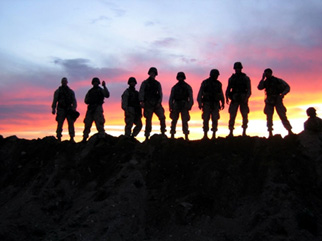
Course Description:
This course will examine major issues and problems concerning the history
of U.S. foreign policy toward the Middle East, from 1914 to the
present. This is an upper division course: students are expected
to complete all of the reading on time and to participate actively
in discussion.
Course Objectives:
After successful completion this course, students will be able to:
• Discuss the growing involvement of the United States in the affairs of the Middle East, a consequence of America’s global power.
• Assess Middle Easterners’ ongoing quest for political independence and self-mastery, including the rise of indigenous resentment.
• Identify underlying forces in the rise of modern terrorism.
• Discuss U.S.-Middle East relations, not only in political terms but also in cultural, economic, and social terms. Therefore, while we will of course look closely at official U.S. policy toward the Middle East and of Middle Eastern countries toward the United States, we will also look at other official and unofficial forms of relations. Cultural relations, as represented by films, cartoons, and other media, will be of particular importance in this regard.
• Analyze and evaluate historical material.
• Examine and assess U. S. presidential leadership and other national security and military decision makers associated with the Middle East, 1914-2006.
• Evaluate the impact of the Iraqi War upon our nation, our diplomatic relations with the Middle East.
• At the conclusion of the course, students should be
able to identify the major problems in this subject; identify and
explain the
principal scholarly disputes about those problems; and make a reasoned
appraisal of the strengths and weaknesses of the relevant arguments
in each case. In particular, they should be able to assess the significance
of the War on Terror in its World context.
COURSE REQUIREMENTS:
1. Map Quiz: Students will be given a blank map, and will have to identify
each country, major cities, and a few regional geographic features.
They will have the list available when taking the quiz.
2. Mid-Term Examination:
A mid-term examination will be given on Tuesday,
March 2, 2010. The exam will cover all class notes and
readings up to that
time.
The
instructor will provide students with a comprehensive study guide ten
days prior to the exam.
3. Quizzes:
There will be five unannounced quizzes over the course of the semester.
They will consist of multiple-choice questions and test students'
knowledge of assigned readings for a given topic area. Note: No Make-up
Quizzes.
4. Book Reviews:
Each student must two book reviews (David Farber, Taken
Hostage: The Iran Hostage Crisis and America’s First Encounter
with Radical Islam and John Lewis Gaddis, Surprise, Security,
and the American Experience). These reviews should be no less than 750 words
no more than 1,250 words approximately three-to five-typewritten, doubled-spaced
pages).
5. Oral Final Exam:
At the end of the semester, students will meet with me for a 25 minute
period. During these sessions, I will ask individual questions
and expect individual responses. I reserve the right to ask about
anything we have covered in the readings, movies, and discussions.
Each person will be asked at least 2 questions and possibly 3.
Each student will have 2-4 minutes to respond to the questions.
Failure to show up for your appointment results in an F. Why am
I doing this? In the real world you will be challenged to think
on your feet whether it is in the business, law, policy, scientific,
or academic communities. The exam prepares you for law and graduate
school and many other careers you may choose.
6. Class Participation:
The most subjective of categories includes faithful and attentive attendance
and classroom interaction. All students are expected to come to class
ready to participate in meaningful dialogue and discussion of the
lecture and assigned readings. This category evaluates the level
of effort put into this course rather than academic success. It also
takes into the account the fact that the content of the course material
is not merely academic, but also spiritual in nature and hence the
overall goal is to apply it our lives in a way which pleases our
Lord.
Deadlines: Papers are due in class on the assigned date! No excuses.
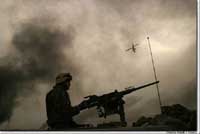
Grade Distribution:
| Map Quiz | 35 points |
| Mid-term Examination | 100 points |
| Quizzes | 100 points |
| Final Exam | 100 points |
| Book Reviews | 200 points |
| Class Participation | 50 points |
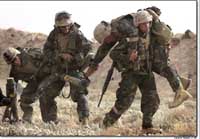
Attendance:
ATTENDANCE IS MANDATORY. YOU ARE ALLOWED TO MISS CLASS
ON FOUR (4) DAYS. STUDENTS WHOSE CUTS EXCEED FOUR WILL RECEIVE A GRADE OF
XF (FAILING DUE TO ABSENCES). IN LIGHT OF THIS POLICY, I STRONGLY URGE YOU
TO DROP THIS COURSE IF YOU DO NOT PLAN TO BE IN CLASS.
Plagiarism:
Plagiarism is copying from a source without acknowledging it. It is academically
dishonest and should not be tolerated in any course. Plagiarism will result
in an F for the assignment and could well jeopardize your grade for the course.

Course Textbooks and Materials
 |
Helpful Websites and Online Newsletters:
Al Bawaba: The Middle East Gateway
ArabNet
Saudi-U.S. Relations Information Service
GulfWire Digest
Course Outlines
PART I THE EMERGING ORDER AND THE CHALLENGE OF MODERNITY
Dates |
Lectures |
Readings |
Documents & Articles |
| January 14 | Introduction | ||
| January 19 | First World War & Ottoman Empire | Lewis, start McAlister, x-42 |
|
| January 21 | The Great Interlude | Lewis, finsih | The Palestine Mandate |
| January 26 | Film: Lawrence of Arabia | ||
| January 28 | Second World War | Lewis, 345-356 |
Handout |
| February 2 | Origins of the Cold War | McAlister, 43-83 | |
| February 4 | Truman and the Creation of Israel | Immigration into Palestine Partition of Palestine |
|
| February 9 | Discussion: Safe Haven. | ||
| February 11 | IKE and the Cold War | Arms to Arab Countries | |
| February 16 | Suez Crisis | McAlister, 84-124 | Restrictions Israeli Shipping |
|
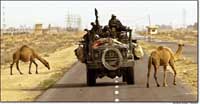 |
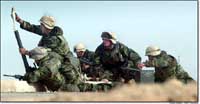 |
PART II THE CLASH OF CIVILIZATIONS
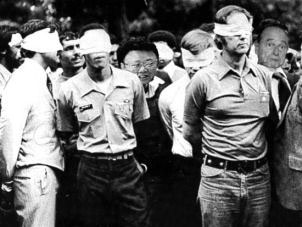
Dates |
Lectures |
Readings |
Documents/Articles |
| February 18 | JFK & Arab Nationalism | ||
| February 23 | Johnson: Takes Sides | ||
| February 25 | Nixon Doctrine | ||
| March 2 | Mid-Term Exam | ||
| March 4 | Film: One Day in September | McAlister, 155-197 Read Farber, Taken Hostage. |
|
| March 16 | The Yon Kippur War | Separation of Forces Israel & Syria | |
| March 18 | Carter & Camp David | The Camp David Accords | |
| March 23 | Iranian Revolution | McAlister, 198-216 | |
| March 25 | Soviet Invasion of Afghanistan | McAlister, 216-234 | |
| March 30 | The First Palestinian Intifada | ||
| April 1 | The Gulf War | McAlister, 235-259 | |
| April 6 | |||
| April 8 | The Oslo Peace Process | ||
| April 13 | The US & the Kurds | McAlister, 259-276 | “Clash of Civilizations” |

PART III AMERICA'S WAR ON TERROR
 |
 |
 |
| April 15 | America Confronts Terror | ||
| April 20 | The US & Osama bin Laden | "While
Clinton Fiddled” “US Missed Chances to Seize bin Laden” |
|
| April 22 | Film: What the West Needs to Know | David Rose, “The Osama Files” | |
| April 27 | September 11 and the Aftermath | “Sumer
to Saddam” “Case Closed” “Iraq & the Arabs Future” |
|
| April 29 | Discussion: Krakauer, Where Men Win Glory | "Vietnam and Iraq" | |
| April 30 | Final Exam Week | ||
|
